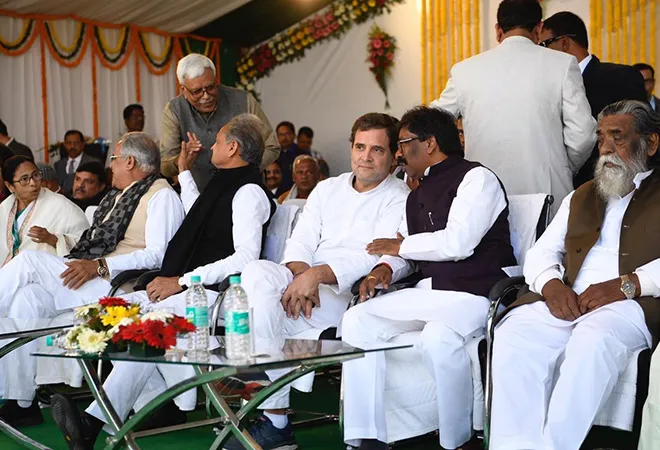
A clear verdict for the Mahagathbandhan -Jharkhand Mukti Morcha (JMM)-Congress- the Rashtriya Janata Dal (RJD) alliance in the tribal dominated state of Jharkhand and the defeat of the first ever BJP government of former Chief Minister Raghubar Das has a clear message for all the political parties that democratic dynamics has its own way to catch with changing ground realities of day-to-day life of citizens.
In the five phased elections that stretched from 6 November to 20 December, the JMM-Congress alliance received 35.35% popular votes winning 47 seats out of total 81seats while the BJP-led NDA alliance got 33.37% polled votes winning 25 seats that were 12 less than its tally in 2014. The JMM won 30 seats-11 more than its 2014 tally- with the Congress winning 16 seats improving its tally of 2014 by 10. The other partner of the winning alliance-the RJD won one seat.
The Jharkhand Vikas Morcha (JVM) of former state chief minister Babulal Marandi, All Jharkhand Students Union (AJSU) former alliance partner of the BJP, Communist Party of India (M-L) L, the Nationalist Congress Party (NCP) and independents won 3, 2, one, one and two seats respectively.
While incumbent chief minister Raghubar Das lost the election from Jamshedpur (East) to one of the BJP rebels Saryu Das by over 15000 votes who had served as a minister in the former’s cabinet and had decided to challenge him as an independent candidate. Even state BJP chief Laxman Giluwa failed to win the election.
Surprising and disappointing was the BJP’s loss seen in the backdrop of its performance in the 2019 Lok Sabha elections when it along with the AJSU had won 13 of the 14 seats with a vote share of over 55 percent which means a clear drop of about 12 percent popular votes. The BJP’s loss could have been more humiliating if we see the electoral data closely as 16 out of the total 81 seats were won by less than five percent votes and out of which nine were pocketed by the saffron outfit.
Though poll analysts and seasoned electoral observers have quoted host of reasons for the defeat of the BJP, one factor has been underlined by most of them is the assertion and significance of regional forces. The BJP, because of its arrogance and misplaced faith in its own strength and popularity, refused to accept the demand of its erstwhile alliance partner AJSU which was asking for 20 seats that resulted in loss of both.
On the other hand, the Congress decided to give precedence to -JMM- regional partner projecting its leader Hemant Soren as the alliance’s chief ministerial seats and settling for 31 seats for itself giving major share of 43 to JMM and seven seats to RJD and thus succeeded in ousting the BJP government from power exploding the myth of invincibility of Prime Minister Narendra Modi and Union Home Minister Amit Shah duo.
The JMM, which represents the tribal face of a state that has 26.3 percent of its total population of tribals, cornered majority of the scheduled tribes (ST) seats winning 19 out of total 28 ST seats in the state with Congress winning 6 of them and the BJP getting two only with rest going to different parties. In 2014 assembly elections, the BJP had won 11 while the JMM had wrested 13 and the Congress had none. There are other pockets in the state-such as Dumka district- where there is significant tribal population. Results in those constituencies have also impacted the BJP’s electoral fortunes.
In fact, the BJP high command, while choosing a non-tribal as its chief minister in 2014, had insulted the tribal psyche. Its first non-tribal chief minister had further rubbed salt on their wounds when the BJP government in 2016 pushed two bills in the legislative assembly that sought to amend the Chotanagpur Tenancy Act (CTA), 1908 and the Santhal Pargana Tenancy Act (SPT), 1949. These acts had been in place to protect the tribal’ rights over land by imposing restrictions on sale and transfer of Adivasi land in the state. The amendment to section 21 of the CTA and section 13 of the SPT would have removed these restrictions on the use of tribal land by owners and tenants for non-agricultural purposes.
The government move had led to widespread protests state wise that had forced Governor Droupadi Murmu to withhold assent to the two bills. Yet the resentment over the BJP’s intent had percolated among a large section of tribal electorate. Slow implementation of the Forest Rights Act (FRA) was yet another factor.
The BJP has to realise that there was a time when Modi’s popularity and appeal could overcome State leadership’s weaknesses and its government’s failure overcoming anti-incumbency, but that phase is over so no amount of nationalist and raising of emotional issues are going to help. Arrogance beyond a time has never been tolerated in India and the country is going through a phase in which not only the central leadership is arrogant but even local leaders are acting as if power is going to stay indefinitely with the RSS-BJP combine. In Jharkhand it was at full display as not only Modi-Shah were aggressive in their respective meetings and rallies but even Raghubar Das did not lag in displaying his imperial trait.
In short, the BJP paid a price that the Congress paid long back but now with changing times national parties would have to learn to deal with diversities and different political behavior of the regional leadership. It is a message; Jharkhand has given, and Delhi would not be far behind when it comes to it early next year.
The views expressed above belong to the author(s). ORF research and analyses now available on Telegram! Click here to access our curated content — blogs, longforms and interviews.




 PREV
PREV


